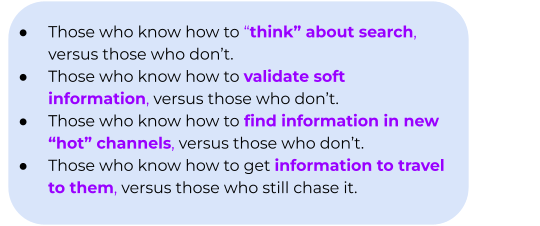Have you been interested in taking a MOOC (Massive Open Online Course), but don't know where to find one or how to get started?
Class Central is a free MOOC aggregator that provides links to a wide variety of courses from universities like Stanford, MIT, Harvard, etc. (offered via Coursera, Udacity, edX, NovoED, and others).
The site allows you to search for MOOCs according to the course name, instructor, subject, start date, length of course, and course provider. Class
Central also offers a "MOOC Tracker" service that will send you email notifications when a MOOC that is of
interest to you becomes available.
MOOCs are a great idea for your students if your school doesn't offer advanced courses for a particular subject and they are also great resources for instructors and others. Try one and I think you will find out how they can be a benefit to you. I did!
▼
Tuesday, December 10, 2013
Thursday, December 5, 2013
Do You Know How to Effectively Search for Information?
I found a resource that I wanted to share with created by Helene Blowers and published in the article entitled, "Do Your Students Know How To Search?" (Holly Clark, Edudemic, October 16, 2013).
I think this article begins to address either the end of the Information Age or at least a progression toward a different stage within the Information Age and the question now becomes what do we do with the information that has been collected? I believe there will be a great need for those who can not only find relevant information, but for those who can analyze information.
According to the article:

Clark continues the article by including some of the searching skills and vocabulary that she believes we should be teaching our students (and learning ourselves):
I think this article begins to address either the end of the Information Age or at least a progression toward a different stage within the Information Age and the question now becomes what do we do with the information that has been collected? I believe there will be a great need for those who can not only find relevant information, but for those who can analyze information.
According to the article:
There is a new digital divide on the horizon. It is not based around who has devices and who does not, but instead the new digital divide will be based around students who know how to effectively find and curate information and those who do not. Helene Blowers has come up with seven ideas about the new digital divide – four of them, the ones I felt related to searching, are listed below.
Some of these skills include:
- Quotation Marks
- Dashes
- Two Periods
- Site Search
- Country Codes
- Filter Bubbles
- Primary Sources
Please click HERE to find out more about these search tools and how to improve your internet searches.


